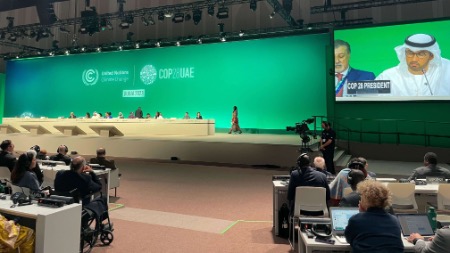Opinion
The apple of concord

Everyone can leave Dubai with their heads held high, even if some would have liked more and others less: more or less pressure on fossil fuels, more or less financial support for the poorest countries. This proves that this is the best outcome and the only possible agreement.
In fact, the word that comes up most often in the comments is "historic", as demonstrated by the standing ovation reserved for its President, Sultan Al Jaber. Aware of having the weight of the world’s attention, he knew that failure was not an option. It must be said that the Emirati presidency spared no effort and did not fall short of the mark - enough to answer the many critics who condemned it from the outset.
It would be simplistic to categorise the players involved as good guys and bad guys. This is a Greek tragedy, not a Hollywood script. Some have put their heart and soul into the fight against climate change, others more hypocritically, secretly hoping that the outcome of the negotiations will not push them too far. There were also those who continue to pollute, blaming the prevailing laxity, and those who had the audacity to support fossil fuels.
Imagine yourself as the Minister of a country whose economy is 85% dependent on hydrocarbons. Would you sign the death warrant for your country’s livelihood at COP28? As the UN format demands consensus, we often end up with the lowest common denominator.
And yet, for the first time, fossil fuels are included in the final text of a COP. Although the famous "phase out" of fossil fuels is not explicitly called for, the wording clearly echoes the need to free ourselves by "transitioning away from fossil fuels" in order to keep the 1.5°C target, which some people were even willing to give up. This is the best we are going to get.
The solutions for decarbonisation are laid out in a way that satisfies all parties involved: a tripling of renewable energies and a doubling of the annual increase in energy efficiency. The wording is meant to appeal to the proponents of cleantech, carbon capture and sequestration (CCS), and to cater to gas producers with a transition to low-emission fuels. The document also addresses nuclear power for those who imagine that its price will remain competitive. Methane is also the subject of a special mention, as are a number of other issues including the abandonment of fossil fuel subsidies that are not designed to help the poorest countries, and the mobilisation of funding for developing countries.
To achieve this consensus, it was necessary to accept a differentiated timetable depending on the level of development and dependence of the countries on hydrocarbons, hence the formulation of a "fair, orderly and equitable" transition. At the extraordinary Majlis, that Bedouin tradition which saw all the ministers seated in a circle with no hierarchy, Bolivia urged the parties present to consider national differences.
As Sultan Al Jaber said: "An agreement is only as good as its implementation.” It is here that we must concentrate on achieving the objectives of those who, quite rightly, wanted much more.
Since it's obviously difficult to put the brakes on oil production quickly, let's focus instead on reducing consumption. That depends entirely on us, who burn all that oil. And that's where we have the most to gain.
To reconcile climate action, environmental protection, job creation, economic development, and social justice, let's commit our societies to renewables and efficiency, optimising resources and minimising waste. Let's modernise our world to stop the incredible consumption that justifies all this energy production. Decarbonisation will then become the logical consequence of this modernisation: a benefit rather than an economic sacrifice.
This is what we should really remember about COP28.



